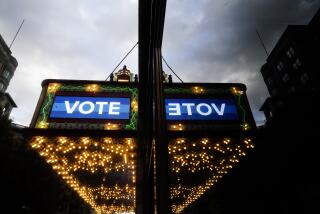The Times Poll : Bush ‘Resume’ Prevails; Geography Aids Dukakis
MANCHESTER, N.H. — Demonstrating their Yankee independence, New Hampshire citizens ignored the judgment of Iowans and sided Tuesday with the candidates--Vice President George Bush and Massachusetts Gov. Michael S. Dukakis--whom they have known longest and felt most comfortable with, interviews with voters by the Los Angeles Times Poll showed.
Bush’s “experience”--the diverse “resume” so derided by Kansas Sen. Bob Dole in his aggressive campaigning--is what appealed to New Hampshire Republicans, rather than any particular ideology or issue.
Asked their “main reasons” for choosing a candidate, Republican voters answered mostly that it was “experience,” “leadership” and “trust.” Two-thirds of Bush’s supporters said they were influenced by his experience. Put another way, for people who considered experience a major reason for selecting a candidate, Bush was selected by more than 2 to 1 over Dole.
But Dole, the Republican leader in the Senate, was the “leadership” candidate in the opinion of New Hampshire voters. Roughly half of his supporters were looking mainly for leadership. And people in search of a leader chose Dole by 3 to 2.
Republicans who mainly wanted a candidate they could trust generally divided their votes three ways--among former religious broadcaster Pat Robertson, Bush and Dole. The vast majority of Robertson’s voters were looking for somebody they could trust.
In the Democratic primary, as expected, Dukakis benefited from being a fellow New Englander, a quasi-favorite son. Roughly one in 10 Democrats said they selected their candidate mainly because “he’s from New England and he understands our problems.” And one-third of the veteran Massachusetts governor’s support came from people who were swayed, in large part, by his geographical roots.
By contrast, Bush--who was born in Massachusetts, reared in Connecticut and has a summer home in Maine--seemed to benefit very little from his Yankee background. Hardly any Republican voters were concerned about whether a candidate was a New Englander, the Times survey showed.
Favored by Liberals
Dukakis, besides being a local boy, also apparently landed on the right side of most issues in the view of New Hampshire Democrats, particularly the liberals who dominated Tuesday’s voting.
By far the “most important” issue for New Hampshire Democrats was the federal budget deficit, selected by more than 2 to 1 over any other topic as a deciding factor in how to vote. And people mainly concerned about the deficit chose Dukakis by roughly 3 to 2 over Illinois Sen. Paul Simon and Missouri Rep. Richard A. Gephardt. Dukakis’ position on how to lower the deficit has been that he would collect the substantial taxes already owed but unpaid by tax-dodging Americans before, as a last resort, he raised tax rates.
Democrats concerned about the environment and energy policies--which ranked midway on the scale of “important issues”--also backed Dukakis overwhelmingly. The governor clearly had impressed New Hampshire voters by blocking opening of the giant Seabrook nuclear power plant and campaigning vigorously against an oil import tax, which was advocated by Gephardt.
Little Help From Issues
By contrast, in the Republican primary, Bush seemed to be helped little by issues. Republicans, like Democrats, lopsidedly picked the budget deficit as “most important,” choosing it by more than 2 to 1 over any other issue. Bush barely edged Dole among people principally concerned about the deficit.
“Morality in government” was a distant second on the GOP list of important issues. And Robertson had an edge among people concerned about this.
Unlike Iowa, where Dole and Gephardt scored impressive wins in the first major contests of the presidential race Feb. 8, there was not a big bloc of disenchanted, anti-Establishment voters in prosperous New Hampshire to provide victories for these two candidates, who have campaigned heavily on populist campaign themes.
But the survey of New Hampshire voters illustrated again that Gephardt does have an ability to attract conservative Democrats, who will be more in abundance on Super Tuesday when 20 states--most of them Southern--hold primaries or caucuses. Gephardt edged out Dukakis among Democratic conservatives in New Hampshire. Dukakis, on the other hand, beat Gephardt by 3 to 2 among middle-of-the-roaders and Simon by 3 to 2 among liberals.
Type of Role Reversal
There was a role reversal of sorts for Dukakis and Gephardt in New Hampshire, contrasted with Iowa. In Iowa, Dukakis was the “status quo” candidate in the view of Democratic caucus-goers. In New Hampshire, the status quo candidate was Gephardt.
In Iowa, Gephardt appealed to blue-collar workers who were hurting economically. However, there was much less economic discontent in booming New Hampshire. Here, Gephardt appealed to Democratic conservatives who seemed to be reasonably satisfied with their lives.
For example, the one-fourth of Granite State Democrats who approved of the way President Reagan is handling his job voted for Gephardt by a convincing margin over Dukakis. But the Massachusetts governor was supported by 3 to 1 by Democrats who disapproved of Reagan’s job performance.
Unlike in Iowa, Gephardt was favored in New Hampshire by Democrats who felt that “things in the nation are going in the right direction.” But there were very few of these people, only 7%. In New Hampshire, in contrast to Iowa, Dukakis was backed by 3 to 2 over Simon by Democrats who thought “things have gotten off on the wrong track.”
Anti-Reagan Backing for Dole
On the Republican side, 86% of the GOP voters approved of Reagan’s job performance and they backed Bush by a convincing margin. Dole was the anti-Reagan candidate in voters’ eyes, with the 14% who disapproved of the President’s performance choosing Dole by nearly 4 to 1.
Dole’s attempts to sully Bush by aggressively questioning the vice president’s role in the Iran-Contra affair did not sell in New Hampshire. Iran-Contra was the least “important” issue cited by Republican voters, with only 6% terming it a deciding factor in choosing a candidate. But these people went for Dole by 2 to 1 over Bush.
Conservatives made up the “mainstream” of New Hampshire Republicans. Two-thirds of the GOP voters described themselves as conservatives to Times interviewers. And Bush was favored by this group by 3 to 2 over Dole, signaling potential problems for the Kansas senator in the Super Tuesday states. Even among the one in five Republicans who characterized themselves as “very” conservative--the hard-core right--Bush was supported over Robertson and New York Rep. Jack Kemp.
GOP Liberals for Dole
Dole’s New Hampshire constituency seemed to be GOP liberals, who favored him by 4 to 3 over Bush. But liberals were a small minority of the party, just one in 10.
The much-advertised “bump” that Iowa victors were supposed to have received by winning in the Hawkeye state ultimately turned into something more of a molehill.
Charting the candidates’ path to the New Hampshire primary voting, the Times poll found that Dukakis led among Democrats who made up their minds through the end of January. Roughly half the Democrats fit into this category of early deciders. But Gephardt took a slight lead among people who decided between the Iowa caucuses and last weekend. Then the Missouri congressman slipped.
Among the GOP, Robertson got no benefit at all from his stunning second-place finish in Iowa. In fact, he might have tripped over his “bump” by drawing closer scrutiny from the news media.
The survey indicated that Bush had the best grass-roots campaign organization among Republican candidates in New Hampshire, with one-fourth of GOP voters saying he “made the greatest effort to win my vote.” Dole was not close. On the Democratic side, Dukakis had the best organization, followed far back by Gephardt.
Lack of Black Voters
The Rev. Jesse Jackson, running in another contest--like Iowa--where he was handicapped by a significant lack of black voters, basically was supported by upscale whites.
Gary Hart, who won big here four years ago, generally was not trusted by New Hampshire Democrats this time, the survey indicated.
The Times poll, directed by I. A. Lewis, interviewed 6,556 voters as they left their precincts. Of these, 53% voted in the Republican primary and 47% cast ballots in the Democratic contest.
TAPPING THE SENTIMENT IN NEW HAMPSHIRE
DEMOCRATS
How the top three Democratic finishers fared among:
Liberals Moderates Conservatives 47% 29% 17% of votes Dukakis 37 36 27 Gephardt 11 24 31 Simon 23 14 14
REPUBLICANS
How the Republican candidates fared among:
Liberals Moderates Conservatives 10% 21% 63% of votes Bush 37 42 37 Dole 45 36 24 Kemp 8 10 15 Du Pont 6 6 12 Robertson 4 6 12
Source: Los Angeles Times Poll
More to Read
Get the L.A. Times Politics newsletter
Deeply reported insights into legislation, politics and policy from Sacramento, Washington and beyond. In your inbox three times per week.
You may occasionally receive promotional content from the Los Angeles Times.











